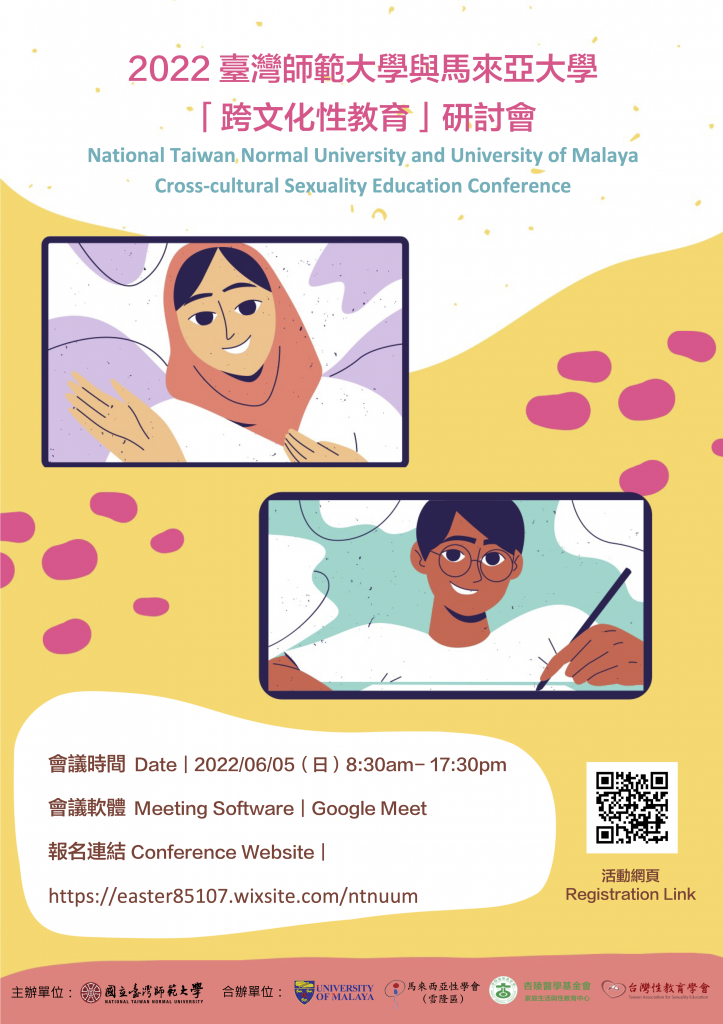- 日期 Date:111年06月05日 June 5th, 2022
- 時間 Time:08:30-17:30
- 會議軟體 Conference Software:Google Meet
- 報名 Registration:https://docs.google.com/forms/d/e/1FAIpQLScVGn59u2CG2QPio-0AxsSkKwYNbk9oKdtmkLcoK-totCcHIQ/viewform
- 活動網址 Official Website:https://easter85107.wixsite.com/ntnuum
研討會介紹 About this Conference
從2019年至今,國立臺灣師範大學(NTNU)與馬來西亞馬來亞大學(UM)持續進行性教育學術交流與研究合作,以增進兩國性教育的發展。今年(2022)本校與馬來亞大學性教育學術交流,將聚焦探討「跨文化性教育」這個主題。馬來西亞是一個多宗教信仰的國家(以伊斯蘭為主),宗教對性觀念及行為有很大影響, 因此在性教育的實施需要思考如何尊重不同宗教信仰在性教育的差異。台灣是一個開放的島國, 國人與各國結婚的比率相當高, 2020年臺灣各級學校新住民子女學生數合計30.5萬人,占全體學生總數之7.3%。隨著新住民子女學生數的增加,台灣的教師也需要開始思考對學生實施性教育時, 如何把不同文化、宗教信仰與種族的性觀點設計到課程與教學,實施「文化回應教學」以及將「多元文化教育」議題融入性教育。
今年台師大與馬來西亞馬來亞大學的性教育學術交流,很高興能結合台灣杏陵醫學基金會、台灣性教育學會及馬來西亞性學會等兩國性教育民間團體一起加入,邀請兩國教育現場優秀的教師加入, 成立台馬「跨文化性教育」教學設計共備社群, 在台師大及馬來亞大學兩所大學教育學院的教授團隊指導下, 經過無數次的共備會議, 對話與思辯下, 依據2018年聯合國教科文組織(UNESCO)所出版《國際性教育技術指導綱要》中所提出的「核心概念」設計性教育課程,課程主題分別為「青少年情感與戀愛」、「性/性別的多樣性」、「性侵害防治」、「婚前性行為與墮胎議題」及「青春期保健-月經、自慰議題」。如何設計適當的性教育課程,照顧班上新住民學生可能面臨的宗教與文化衝突,成為臺灣中學教師在實施性教育時將面臨的課題。
初步構想是先增能馬來西亞獨中華人教師性教育專業知能, 然後再透過獨中的華人教師來分享給以馬來人為主的公立學校。此外, 同時需要增進獨中華人教師具備探討性教育課程中不同社會文化差異的性教育議題,以及實施「文化回應教學」的教學知能。因此,本研討會邀請臺灣五位國中教師以及馬來西亞五位華中教師,組成課程共備小組,並將於此次研討會(2022,06,05)分享透過兩國共備研發之跨文化性教育課程。其中將聚焦探討如何將不同社會文化的差異導入國中(初中)性教育課程,以及如何進行性教育「文化回應教學」,期待透過兩國交流提升臺灣與馬來西亞教師跨文化性教育之知能。
Since 2019, National Taiwan Normal University (NTNU) and University Malaya (UM) in Malaysia have continued to conduct academic exchanges and research cooperation, hoping to enhance the development of sexuality education in the two countries. This year (2022), the academic exchange between our school and the University of Malaya on sexuality education will focus on the topic of “cross-cultural sexuality education”.
Malaysia is a multi-religious country (mainly Islam), and religion has a great influence on sexual concepts and behaviors. Therefore, in the implementation of sexuality education, it is necessary to consider how to respect the differences between different religious beliefs in sexuality education. Taiwan is an open island country. The rate of marriage between Chinese and other countries is quite high. In 2020, the number of children of new residents in schools at all levels in Taiwan totaled 305,000, accounting for 7.3% of the total number of students. With the increase in the number of students of new resident children, teachers in Taiwan also need to start thinking about how to design sexual perspectives of different cultures, religious beliefs and races into curriculum and teaching when implementing sexuality education for students, implement “culturally responsive teaching” and incorporate The issue of “multicultural education” is integrated into sexuality education.
This year, the academic exchange of sexuality education between National Taiwan Normal University and the University of Malaya, Malaysia, is very happy to join the two countries’ sexuality education civil organizations such as Taiwan Xingling Medical Foundation(台湾杏陵医学基金会), Taiwan Sexuality Education Society(台湾性教育学会) and Society for Scientific Study of Sexuality Kuala Lumpur And Selangor(马来西亚性学会). Excellent teachers joined to set up a Taiwan-Malaysia “Cross-Cultural Education” teaching design community. In this conference, five middle school teachers from Taiwan and five Chinese teachers from Malaysia were invited to form a curriculum co-preparation team to share the research and development through the two countries’ co-preparation. The cross-cultural education curriculum. It will focus on how to introduce different social and cultural differences into the junior high school sexuality education curriculum, and how to carry out “cultural response teaching” in sexuality education.
